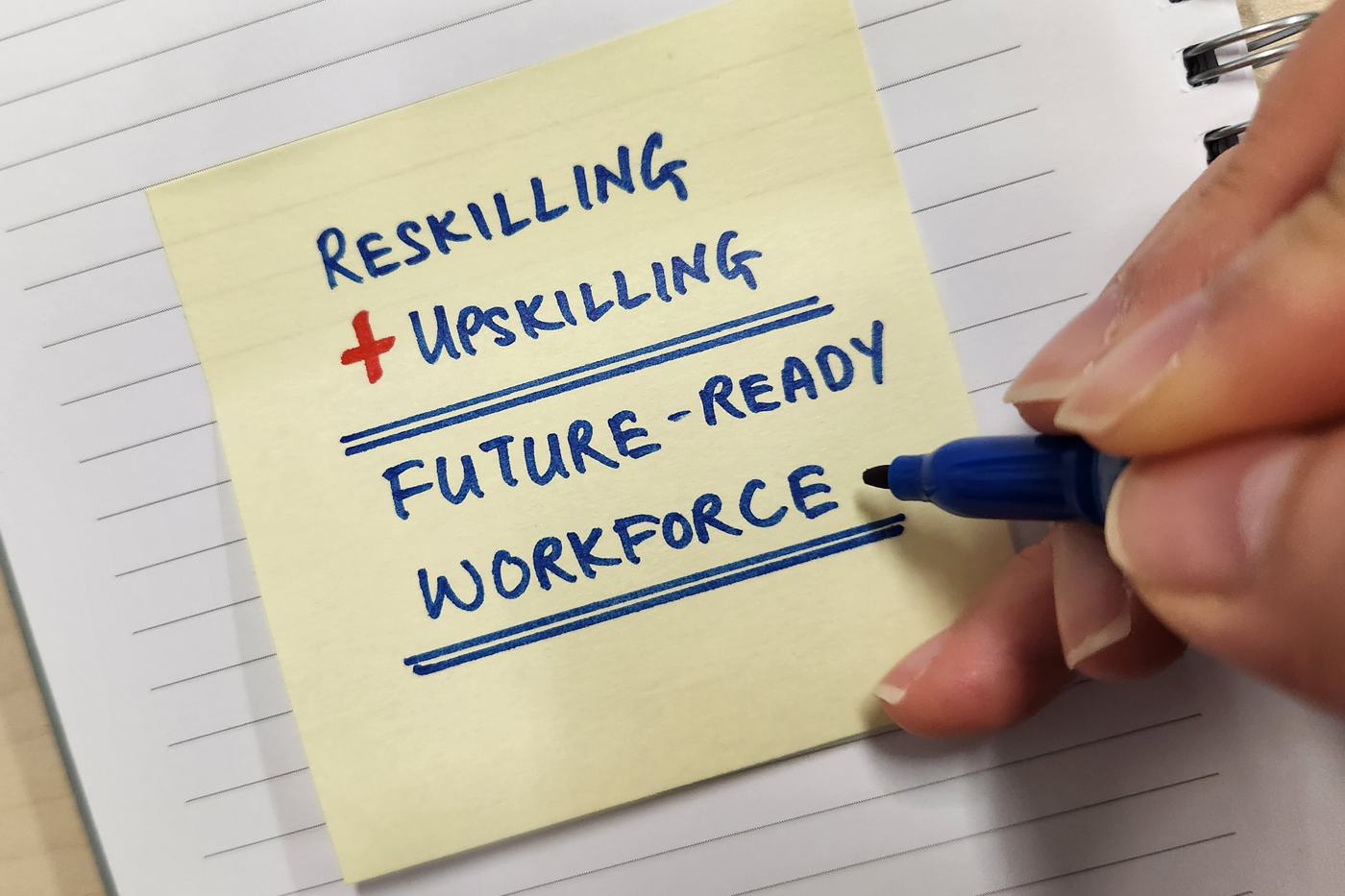Preparing for What’s Around the Corner
By the end of the 2020s there will be a plethora of new job titles hitherto unknown even among field experts. How can professionals equip themselves and confidently tackle the changes ahead?

By Chartered Banker, UK
In recent years entire economies and industries have been completely transformed as technological developments have advanced leaps and bounds. New technologies have redefined the goods and services consumers demand, reinvented businesses’ operations and processes, created whole new industries and sectors, and broken down geographical boundaries.
As a result, the skills, talent and job roles required in this new world will likely be very different to those of the past – while understanding exactly what those will be in such a fast-changing world is difficult. In fact, a report carried out a few years ago by the Institute For The Future (IFTF) forecast that an astonishing 85% of the jobs that will exist in 2030 haven’t even been invented yet.
While that statement may feel provocative, a glance at some of the roles that have emerged in recent years supports the notion that there may well be plenty of new ones to emerge between now and the end of the decade. Who in 2005 would have foreseen today’s demand for mobile app developers, virtual design and construction consultants, cloud and artificial intelligence (AI) specialists, and blockchain engineers?
And, while the exact roles of tomorrow are difficult to predict, Rachel Maguire, Research Director, IFTF, believes the focus will certainly continue to be on digital. “By 2030, we’ll likely be living in a world where artificial assistants help us with almost every task, not unlike the way email tries to finish spelling a word for users today.
“For the humans, for the people who are digitally literate who are able to take advantage, they’ll be well positioned to elevate their position, elevate the kind of work they can do, because they have, essentially, an orchestra of digital technologies that they’re conducting. They’re playing the role of a conductor, but the work’s being done, at least in partnership, with these machines.” Others also believe that tech and digital roles will dominate the required skill sets of the future. Forbes, for example, recently published a report titled The Top 10 In-demand Skills for 2030.
Top of its list was ‘digital literacy’, and Forbes predicts more than half of all jobs in 2030 will require an understanding of digital technology. As AI and automation revolutionise industries, ‘augmented working’ skills will also become essential, it stated. ‘Sustainable working’, whereby staff can minimise waste, will also be critical as the world faces up to the effects of rapid climate change. Other key skills likely to be in demand, according to the report, include ‘critical thinking and analysis’, ‘data skills’, the ability to engage with virtual collaborative working platforms – and ‘soft skills, such as creative thinking and emotional intelligence’.
So, what new skills and capabilities will be needed to serve and advance the banking profession specifically – the abilities that banks will be looking for and the capabilities bankers of the future should focus on obtaining?

A recent report by the Financial Services Skills Commission (FSSC), entitled Reskilling Everywhere All At Once, Skills for the Future of Financial Services, attempted to explore that very topic.
Released in the spring, the report outlined how today’s bank boardrooms must prioritise reskilling to boost innovation, productivity and competitiveness. Following a survey of various FS firms over a 12-month period, the report highlighted increasing demand for a baker’s dozen of 13 future technical and behavioural competencies as critical for the profession’s sustainable growth.
On the technical side, these skills were data analysis and insights, digital literacy, software development, cybersecurity, user experience, and machine learning/AI. However, it stated the importance of aligning these with a strong set of behavioural abilities to optimise success. These were adaptability, coaching, relationship management, agility, creative thinking, empathy and teamwork.
Unveiling the report, the FSSC said: “Despite organisations increasing their focus on skills forecasting and upskilling, demand for these future skills is approximately 20% short of supply, further widening the profession’s existing skills gaps.”
Perhaps the biggest surprise here is the focus on so-called soft skills – the behavioural capabilities – needed to support the adoption of digital skills, with the FSSC saying that demand for these is, on average, around 10% above supply.
Looking deeper into the report, the Commission’s findings show that “demand for tech skills continues to grow, and one in eight roles in financial services is now a tech role – double the proportion compared to the wider economy”. It adds that “data analytics and insight skills are most in demand, with 95% of firms identifying this skill as a priority, while machine learning has the largest gap between supply and demand”.
The FSSC also observed that “competition for many of these skills is tough; almost half (47%) of its members found data roles hard to fill and 35% found the same for software roles”.
Furthermore, firms responding to the Commission’s survey said they believe that the ongoing shortages are increasing operating costs and adding to existing staff workloads, impeding opportunities for innovation and growth across the profession.
As the FSSC points out: “Although there has been an increase in future skills, there has also been an exponential increase in demand across all sectors.”
In terms of behaviours, the study held that coaching is the behaviour most in demand, while relationship management is where firms see the biggest gap – with the data suggesting this is in part related to the growing importance of sustainable finance demand from customers.
Clearly, there are big gaps to fill, and those professionals with the direction and the drive to upskill to meet future FS demand will likely see the reward in their careers.
Once the skills and competencies of tomorrow have been identified, the banking profession will need to start building a suitable pipeline to fill demand. A large part of the responsibility for that will fall not just on schools and other academic institutions but also organisations responsible for the development and evolution of skills directly within the profession – such as the Chartered Banker Institute (CBI).
It is with this in mind that the Institute has been carrying out its own research and strategising around the various needs for the future of banking.
As part of this, the Institute’s regular podcast series The Future of Professional Skills and Learning in Banking, hosted by Joanne Murphy, COO, CBI, “brings together banking learning experts, along with those from other professions, to forecast the future of learning and to promote the building of more sustainable careers more widely,” according to Murphy.
Interestingly, one of the themes to emerge from that podcast has been the role that technology itself could play in boosting the uptake of learning and development, a message supported by the rapid growth and take-up of new technologies across the profession during the pandemic. Arguably, that has been the stimulus for a new, technology-driven approach to lifelong learning.
Put simply, the greater connectivity it offers opens the door to more opportunities for learning and development. To cite one example: a banking professional at a regional branch, thanks to technology and changing attitudes to its application, is no longer stuck in a far-flung office and having to obtain books or attend night school to advance their knowledge.

Rather, most banking professionals are now expected to be self-guided and to adopt a growth mindset of their own – supported by access to online resources often tailored to their specific needs.
Of course, another major area of skills in demand lies within ESG. As signatories to the Green Finance Education Charter (now known as the Sustainable Finance Education Charter), the Institute has aligned its learning materials and guidance with other leading professional bodies in the FS sector to help ensure consistency and to raise standards.
The Charter is a world first, designed to help build the capacity and capability of the green and sustainable finance profession, both in the UK and internationally. One of the main aims of the Charter is to ensure, as the UN Special Envoy for Climate Action and Finance, Mark Carney, sets out in the COP26 Private Finance Strategy, that “every professional financial decision takes climate change into account”.
The impact here is far-reaching. Charter signatories between them educate, train and represent approximately one million accountants, actuaries, bankers, financial analysts, insurers, investment managers, treasurers, risk managers and other finance professionals – and reach many more though their public engagement and thought-leadership activities.
Other ESG-focused resources provided by the Institute include: the Sustainability Unlocked video platform, the Ethical Finance Exchange platform in partnership with the Global Ethical Finance Initiative, ethics assessment through the Institute’s Code of Professional Conduct, the Responsible Banking toolkit and the Foundation Course in Green & Sustainable Finance.
This array of resources is certainly supporting the drive to upskill the profession in line with the Institute’s commitment to provide “world-class initial and continuing professional development and lifelong learning to help individuals develop and apply a professional, responsible approach to banking throughout their career, through a wide range of resources”.
This article previously appeared in the Chartered Banker magazine, UK, Summer 2023 edition.